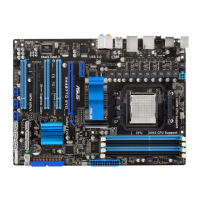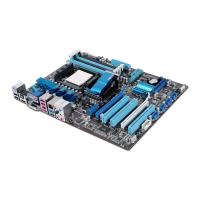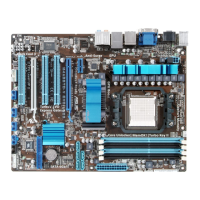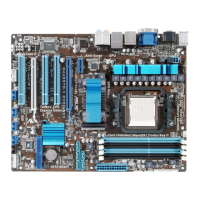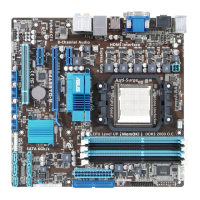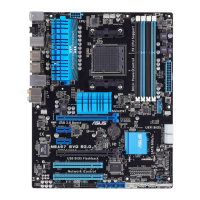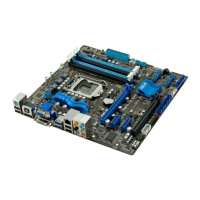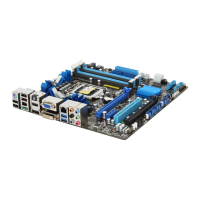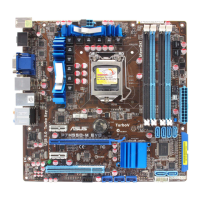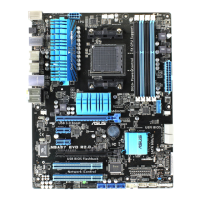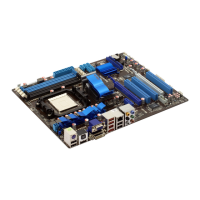
Do you have a question about the Asus M4A785TD-V EVO - Motherboard - ATX and is the answer not in the manual?
| Form Factor | ATX |
|---|---|
| Chipset | AMD 785G |
| Socket | AM3 |
| Max Supported CPUs | 1 |
| Memory Slots | 4 |
| Memory Type | DDR3 |
| Max Memory | 16 GB |
| Graphics Controller | ATI Radeon HD 4200 |
| Audio Codec | VIA VT1708S |
| LAN Controller | Realtek RTL8112L |
| USB Ports | 12 x USB 2.0 |
| RAID Support | RAID 0, 1, 10, JBOD |
| Supported Memory Speed | DDR3 1066/1333/1600 (O.C.) |
| Audio | 8-channel |
| Network Interfaces | Gigabit Ethernet |
| Expansion Slots | 1 x PCIe 2.0 x16, 1 x PCI |
| Storage Interfaces | 6 x SATA 3Gb/s |
| Video Outputs | DVI, VGA, HDMI |
Details FCC and Canadian Department of Communications regulations for digital devices.
Information regarding compliance with REACH (Registration, Evaluation, Authorisation, and Restriction of Chemicals).
Precautions to prevent electric shock hazard during system operation and component handling.
Guidelines for safe operation, including avoiding environmental extremes and short circuits.
Explains the guide's structure, chapter breakdown, and typographical conventions used.
Information on where to find additional details for product and software updates.
Details on supported CPUs, chipset, front side bus, and memory architecture.
Information on integrated graphics, expansion slot types, and storage/RAID capabilities.
Specifications for Gigabit LAN, High Definition Audio, USB ports, and IEEE 1394a support.
Details on ASUS-specific features, power design, and overclocking tools.
Lists rear and internal I/O ports, manageability, accessories, and form factor.
Overview of BIOS capabilities, manageability features, and support DVD contents.
Introduction to the motherboard and a checklist of package contents.
Highlights of the motherboard's main features and technologies.
Details on HyperTransport 3.0, SidePort Memory, and graphics support options.
Information on DDR3 memory support and Gigabit LAN solution features.
Describes ATI CrossFireX, SATA technology, and innovative ASUS features.
Details on ASUS Express Gate, GPU NOS, MyLogo, CrashFree BIOS, Q-Fan, EPU, AI NET 2.
Explains C.P.R. feature for overclocking and Green ASUS compliance.
Essential safety warnings and precautions before installing components.
Description of the motherboard's onboard standby power LED.
Guidance on motherboard placement in the chassis and screw hole locations.
Visual representation of motherboard layout with key components identified.
Index of motherboard connectors, jumpers, and slots with corresponding page numbers.
Step-by-step instructions for installing the CPU into the AM3 socket.
Procedure for securing the CPU with the lever and connecting the CPU fan.
Instructions for installing the heatsink and fan assembly onto the CPU.
Introduction to the motherboard's four DDR3 DIMM sockets and their configuration.
Details on memory configurations and the Qualified Vendors List (QVL).
List of compatible DDR3-1600 and DDR3-1333MHz memory modules.
Further details on DDR3-1333MHz memory modules compatible with the motherboard.
List of DDR3-1066MHz modules and DIMM support configurations (Single/Double-sided).
Step-by-step guide for installing a DDR3 DIMM into the socket.
Instructions for safely removing a DDR3 DIMM from the socket.
Procedures for installing and configuring expansion cards in PCI/PCIe slots.
Description of PCI slots, PCI Express x1, and PCI Express x16 slots.
Instructions for clearing the CMOS RTC RAM to reset BIOS settings.
Detailed description and layout of all rear panel connectors.
Audio port functions for different channel configs and dual display support.
Details on USB, IEEE 1394a, eSATA, DVI-D, and HDMI ports.
System requirements for optimal HD DVD and Blu-Ray disc playback quality.
Instructions for connecting the IEEE 1394a module cable to the internal connector.
Guide to connecting the 24-pin EATXPWR and 4-pin ATX12V power supply connectors.
Instructions for connecting IDE devices using the 40-pin PRI_IDE connector.
Details on SATA connectors, their configurations, and RAID support.
Description of the system panel connector for power, LEDs, and reset buttons.
Instructions for internal USB 2.0 connectors and the LPT parallel port connector.
Details on S/PDIF output and front panel audio connectors.
Information on CPU, chassis, and power fan connectors, and the serial port connector.
Guidance on OS installation and the contents of the support DVD.
Overview of BIOS management and update procedures.
Instructions for installing and using the ASUS Update utility.
Guide to updating the BIOS using the ASUS EZ Flash 2 utility.
Instructions for recovering a corrupted BIOS using CrashFree BIOS 3.
Methods for accessing the BIOS setup program after system startup.
Description of the BIOS menu screen, menu bar, and navigation keys.
Explanation of the menu bar items and their functions.
Details on menu items, submenus, and user-configurable fields.
Explanation of pop-up windows for options and scroll bars for navigation.
How general help and item descriptions are displayed in the BIOS.
Overview of basic system information available in the Main menu.
Instructions for setting the system time and date within the BIOS.
How the BIOS detects IDE and SATA devices and displays their information.
Configuration options for LBA, Block Transfer, PIO Mode, DMA Mode, and SMART.
Settings for SATA channel enabling and type selection (SATA, RAID, AHCI).
Details on BIOS, Processor, and System Memory auto-detected information.
Introduction to JumperFree Configuration for CPU and GPU overclocking.
Options for CPU overclocking, reference clock, and GPU overclocking.
Settings for PCIE overclocking, CPU frequency multiplier, and voltage.
Options for CPU over voltage, VDDNB voltage, and HyperTransport configuration.
Configuration for memory clock mode, timing, and voltage.
Detailed configuration of DRAM timing parameters like TCL, TRCD, TRP, etc.
Settings for memory over voltage and chipset over voltage.
CPU features like GART Error Reporting, Microcode, SVM, Cool 'n' Quiet, C1E.
Settings for NorthBridge, memory interleaving, and clock configurations.
Configuration for ECC memory mode and alternate VID in low power states.
Settings for primary video controller, UMA frame buffer, and internal graphics mode.
Settings for graphics frame buffer, HDMI audio, and onboard serial/parallel ports.
Configuration options for onboard audio, LAN, and 1394 controllers.
Configuration for HD Audio, Onboard LAN, and 1394 controllers.
Settings for PCI/PnP devices, IRQ, DMA channel resources, and memory blocks.
Options for enabling USB functions, USB 2.0 controller mode, and mass storage.
Introduction to Power menu settings like Suspend Mode and ACPI support.
Configuration options for system suspend modes (S1, S3, Auto).
Settings for ACPI 2.0, APIC support, and APM configuration.
Configuration for power loss restore, PME wake, Ring wake, and RTC alarm wake.
Settings for monitoring CPU temperature, fan speeds, and voltages.
Enabling or disabling the Smart Q-Fan feature for intelligent fan speed adjustment.
Overview of boot options and configuring boot device priority.
Settings for Quick Boot, Full Screen Logo, and AddOn ROM display mode.
Settings for bootup Num-Lock state and error reporting (Wait for F1).
Options for system security settings, including supervisor passwords.
Setting supervisor password and defining user access levels to BIOS setup.
Setting and clearing user passwords, and password check options.
Introduction to the Tools menu for special function configurations.
How to access and use the ASUS EZ Flash 2 utility from the BIOS.
Enabling/disabling ASUS Express Gate and configuring its timers.
Enabling or disabling the Realtek LAN cable check during POST.
Options for exiting the BIOS setup utility.
Procedures for saving or discarding changes made in the BIOS setup.
How to load optimal or failsafe default values for BIOS parameters.
